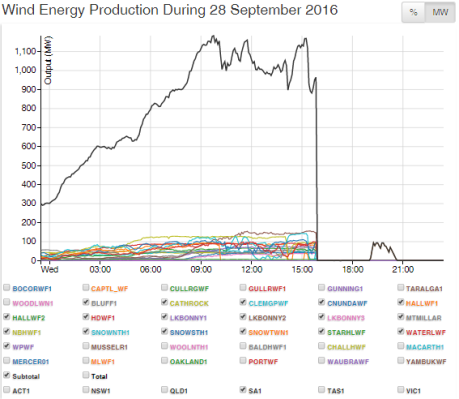SOURCE:
Now and again the law catches up with the shysters that run wind farms and so-called big batteries.
Failing to deliver on a promise ordinarily results in an order for damages to be paid to the unwitting victim. In addition, in a regulated electricity market, the regulator will sometimes join in and seek its pound of flesh, as well.
Back in September 2016, South Australia’s wind farms were the cause of utter chaos when the automatic and instant shutdown of their turbines during a spring gale (see above) resulted in Australia’s only ever statewide blackout.
Parts of the state were left without power for over a fortnight. The operators involved cost the State’s businesses and households close to $400 million, but, for their part, walked away with a paltry $3.5 million fine (see below).
In a separate incident in October 2019, SA’s big Tesla battery had been contracted to provide Frequency Control Ancillary Services and, despite all the talk about its significance in that domain, failed to deliver so much as a watt when it was needed most.
Notwithstanding, its owners still charged the grid manager $3.3 million for power that it promised to but never delivered. Ultimately, the battery’s owner was forced to repay the amount that it had unduly pocketed and a Federal Court Judge whacked the battery’s owner with a $900,000 fine. Meagan Dillon gives a few of the details below.
The owners of four wind farms in South Australia and the state’s big Tesla battery have been fined more than $4 million over two separate breaches identified during major grid disturbances.
Federal Court Justice Anthony Besanko fined three subsidiaries of AGL Energy a total of $3.5 million for failing to seek approval for critical systems settings on their Hallett 1, 2, 4 and 5 wind farms in the state’s Mid-North for more than three years, including on the day of the 2016 statewide blackout.
He found the company failed to inform the Australian Energy Market Operator (AEMO) about a protective setting within their wind farms, which caused turbines to power down moments before the blackout.
“The resulting harm of this conduct was that AEMO’s ability to determine the secure operating limits of the power system, and ensure its resilience during abnormal conditions, was compromised,” he said in his judgement.
“This, in turn, created a risk of impairing AEMO’s ability to maintain the power system in a secure operating state.”
The Australian Energy Regulator (AER) originally alleged the failure was a “contributing cause” of the blackout, but withdrew the allegation during proceedings.
[STT doesn’t know why the AER backed off. The root cause was obvious: ‘GUILTY’: South Australia’s Statewide Blackout Caused by Deliberate Wind Farm Shutdown]
Three other South Australian wind farms, including those at Snowtown, Hornsdale and Clements Gap, have been previously fined a total of more than $2.5 million for similar breaches.
The failure was identified when an unexpected outage at the Kogan Creek coal plant in Queensland in 2019 caused grid disturbances.
At the time, the battery had been paid to be on stand-by to rapidly produce power to help restabilise the grid in the event of such outages.
“In October 2019, there was an unplanned outage at Kogan Creek Power Station in Queensland,” Justice Besanko said.
“In response to the Kogan Creek event, the power system frequency fell, and Hornsdale Power Reserve was required to deliver fast raise services in accordance with the amount it was enabled to provide.”
But he said the battery did not power up when needed.
The court heard that investigations after the Kogan Creek incident had revealed the battery had been unwittingly been under-delivering on promised stability services since Tesla had performed a firmware update in July 2019.
After the event, the battery’s owner agreed to repay more than $3.3 million it had received for providing contingency services that it had not, in fact delivered, over a four-month period.
“It is vital that generators do what they say they can do if we’re going to keep the lights on through our market’s rapid transition to more variable renewable generation,” she said.
“It’s what is expected by every household, small and large business across Australia when they pay their electricity bills.
